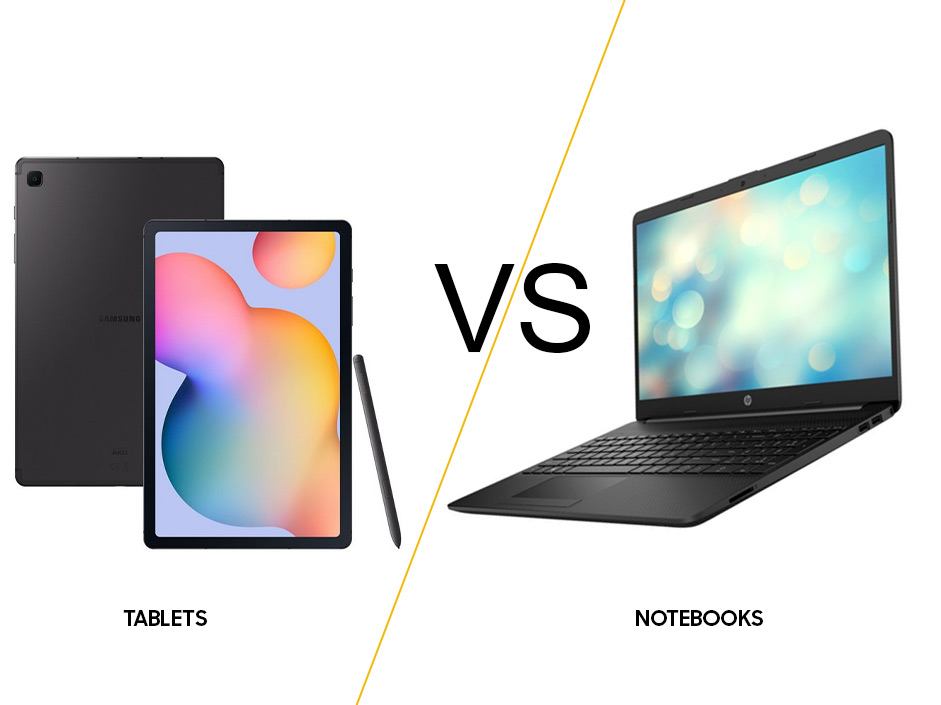Tablets Vs Notebooks: Which One is Better and Why

Table of Content
Introduction:
Modern workspaces whether small or large do have many gadgets that play a key role in the productivity and efficiency of business houses. Out of all the devices that are used by workers, tablets and notebooks are very common. Since both of them are portable, lightweight, and compact, they are carried during traveling or when CEOs or other staff are away from the office to perform multiple tasks like updating websites, reviewing blogs, responding to emails, reading books, taking notes, writing letters and more. Therefore, companies often provide these gadgets to members of staff in order to ensure customer support and other services around the clock. But one question is often asked whether a notebook or a tablet is the right device for employees. To answer this question, understanding the difference between tablets and notebooks is important.
What Are Notebooks?
Notebooks are essentially mobile computers that have been compacted into thinner and lighter hardware. They are portable and can be carried away from offices easily. They can be as powerful as average desktop computers. Notebooks can be used comfortably in meetings, airplanes or offices. They are equipped with cutting-edge features like an HDMI port, 2 or 3 USB ports, a card reader, a physical QWERTY keyboard, a mouse, and an attached screen display. Typically, they can boast 512 GB of storage capacity and 2GB to 4GB RAM and personal computing tasks can be performed with the help of notebooks without any hassle. Notebooks are thus best suited for document creation and web browsing-like tasks. In comparison with their laptops or desktop PCs siblings, they are very compact and weigh 2.5 pounds to 10 pounds depending upon the configuration. They are sleeker and measure less than 3 inches at the most. They can be fit in briefcases, backpacks, and even in large purses.
There are variants of notebooks as well such as Ultrabook. This high-priced variant of notebooks is designed to reduce the differences between laptops and notebooks. They can perform all tasks that can be carried by ordinary laptops. Notebooks represent the advancement in technology because they have full functionality and performance of PCs with added advantages of portability, lesser consumption of power, outdoor working, and many more.
What are Tablets?
Tablets, PC Tablets or Tablets Computers are devices that combine the features of mobile phones and laptops within one piece of hardware. They are extremely portable and can even fit in pockets or purses easily. Some models of tablets weigh less than a pound. They apparently resemble cell phones but are a bit larger. Tablets are equipped with all features of leading mobile phones like touch display, good quality camera, pixel density, the battery in flat packages, GPS, etc. But they have large display screens that provide a pleasurable viewing experience and greater comfort in reading books or consuming other content. Tablets are provided with handwriting recognition software for accurate deciphering and converting into text. Though they don’t have a physical keyboard, they do have an on-screen display virtual keyboard to perform various tasks efficiently. As compared to notebooks or laptops, they boast a much longer battery life. Some Tablet models can provide up to 14 hours of battery life. Additionally, an input device, Stylus, can also be used to interact with the touch screen of the tablets along with fingers.
There are also variants of tablets as well for instance Taskbooks. Taskbooks are rugged tablets that have been designed to perform industry applications under extreme circumstances.
Which Device is Better?
Since we have understood the basic differences between tablets and notebooks, now comes to the next part: which device is best suited to your needs.
Tablet or Notebook?
Though both of these devices help users satisfy their computing needs while they are on roads or away from offices, they provide distinct features that should be in mind while making decisions. The following points would help you reach the conclusion:
-
Nature of Job or Tasks:
The nature of the job should have a determinant role in choosing between a tablet and a notebook. Generally, tablets are designed for the consumption of content, not the creation of documents or other stuff. Hence, if your job is restricted to responding to emails, browsing the net, reading reports, and attending video conferences, Tablets would do the job. But if you are required to do professional tasks, go for notebooks.
-
Requirement of Professional Software:
If you have to do tasks that can only be done by professional software while traveling, a notebook would be the right choice because the range of software supported by notebooks is much superior and more productive in comparison with apps supported by tablets. But on the slip side, if you are interested in doing photography, playing games, surfing social media, and listening to music, go for tablets.
-
Requirement of Storage:
If you need a large space for doing various tasks, the notebook is the clearer winner here because the notebook can support up to 512GB of space, but tablets can generally boast up to 64GB of memory.
-
Requirement of Connectivity:
Professionally speaking, easy connectivity of gadgets is a highly sought-after feature because devices are often connected to projectors, printers, broadband wires, etc. If you have to deal with such scenarios, notebooks should be purchased because they are equipped with 3 USB ports, an HDMI port, and an Ethernet port for broadband. There is also a Wi-Fi connectivity option as well. Though Tablets do have a Wi-Fi option, they are not compatible with other devices that are often used in the workspace.
Some Words about Morgan Ingland Ltd.
We offer every kind of notebook and tablet you demand. On top of that, we also provide cost-effective notebook accessories as well. Feel free to contact us.